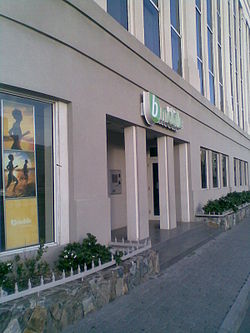Telecommunications in Antigua and Barbuda are via media in the telecommunications industry. This article is about communications systems in Antigua and Barbuda.
This article is about communications systems in Anguilla.
Communications in the Cayman Islands
Telecommunications in Dominica comprises telephone, radio, television and internet services. The primary regulatory authority is the National Telecommunication Regulatory Commission which regulates all related industries to comply with The Telecommunications Act 8 of 2000.
Though Guam is a United States territory, some U.S. long-distance plans and courier services list Guam as an international location. As a result of Guam's being added to the North American Numbering Plan (NANP) in 1997, calls made to the U.S., Canada, or other participating countries from Guam only require the caller to dial a 1 followed by the area code.
Telecommunications in Haiti Internet, radio, television, fixed and mobile telephones.
The Isle of Man has an extensive communications infrastructure consisting of telephone cables, submarine cables, and an array of television and mobile phone transmitters and towers.
Telecommunications in Jamaica include radio, television, fixed and mobile telephones, and the Internet.
Telecommunications in Trinidad and Tobago include radio, television, fixed and mobile telephones, and the Internet.
Communications in the United States Virgin Islands
Communications in Barbados refers to the telephony, internet, postal, radio, and television systems of Barbados. Barbados has long been an informational and communications centre in the Caribbean region. Electricity coverage throughout Barbados is good and reliable. Usage is high and provided by a service monopoly, Barbados Light & Power Company Ltd..
Bermuda has three main television stations, a small cable microwave system, two public GSM services, multiple submarine cables, and two main Internet service providers. In late 2020 a new provider Horizon Communications gained regulatory approval. Horizon Communications offers High speed 4G and soon 5G Fixed LTE Wireless connection, with burstable bandwidth.
This is a list of Communications in Saint Kitts and Nevis.

Telecommunications Services of Trinidad and Tobago Limited is a large telephone and Internet service provider in Trinidad and Tobago. The company, which is jointly owned by the Government of Trinidad and Tobago and Cable & Wireless Communications, was formed out of a merger of Telco and Textel. TSTT no longer holds a monopoly in fixed-line telephone services due to FLOW introducing a fixed-line service of their own, and their cellular monopoly was broken in June 2005 when licenses were granted to Digicel and Laqtel.
Area code 246 is the telephone area code in the North American Numbering Plan (NANP) for Barbados. Telecommunication services in Barbados are regulated by the Government of Barbados's telecommunications unit. The number 246 spells BIM on an alpha-numeric telephone keypad, a nickname for the island.
Area codes 876 and 658 are the local telephone area codes of Jamaica. The first area code, 876, was created during a split from the original 809 area code. Permissive dialing began 1 May 1997 and ended 1 May 1998.
Communications in Grenada
Telecommunications in Guyana include radio, television, fixed and mobile telephones, and the Internet. Early telecommunications were owned by large foreign firms until the industry was nationalized in the 1970s. Government stifled criticism with a tight control of the media, and the infrastructure lagged behind other countries, Guyana Telephone and Telegraph Company (GT&T) holding a monopoly on most such services. In a 2012 census report on Guyanese households, 55.5% had a radio, 82.7% had a television, 27.8% had a personal computer, and 16.2% had internet at home, 49.3% had a telephone landline, and 70.6% had a cellular phone.
LIME, an acronym for 'Landline, Internet, Mobile, Entertainment', was a communications provider owned by the British based Cable & Wireless Communications for its operations in Anguilla, Antigua & Barbuda, Barbados, British Virgin Islands, Cayman Islands, Dominica, Grenada, Jamaica, Montserrat, St. Kitts & Nevis, St. Lucia, St. Vincent & the Grenadines and Turks & Caicos in the Caribbean.
FLOW is one of many trade names of the Caribbean former telecom Cable & Wireless Communications (CWC), now known as Liberty Latin America used to market cable television, internet, telephone, and wireless services provided by the company. Flow also replaces the UTS brand in the Dutch and French Caribbean, following the recent acquisition and integration of United Telecommunications Service (UTS) by Liberty Latin America's CWC division.


